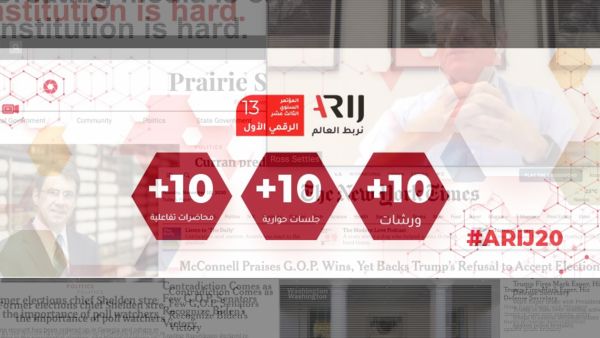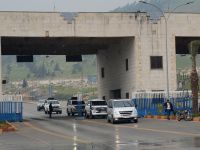More than 2,700 journalists and supporters of investigative journalism from all over the world will digitally convene at ARIJ’s 13th Annual Forum, the largest and first gathering of its kind for Arab journalism, which has kicked off with early events on Friday, November 13, under the slogan “Connecting the World”.
At this year’s ARIJ Forum, conducted virtually due to the pandemic, participants will be able to attend more than 50 events over a month, translated to both Arabic and English; from training workshops and webinars, to lectures, dialogue sessions and one-on-one clinics, to plenaries and panels, presented by some of the world’s best investigative journalists from Japan to Brazil and beyond.
Forum’s official inauguration was held on Friday, December 4. And the annual award ceremony will be held on Sunday, December 6 at 9PM Jordan time, announcing the ARIJ awards for the best Arab investigations according to the ARIJ20 Forum Agenda.
Registration to attend the Forum is free and still open to all journalists and those interested in supporting investigative journalism, via this link. Registration will close on November 20.
ARIJ Annual Forum is a unique regional platform for ARIJeans and guests to exchange the latest tools for digital investigations and data research, and discuss the reality and future of media workers in an institutional context aimed at consolidating a systematic culture of investigative journalism and rooting the values of “accountability media.”
This year's Forum is held as the media industry faces some of its greatest challenges, especially in light of COVID-19, and as relations between the media and governments continue to decline due to the lack of transparency, and the ambiguity of official figures and approaches to dealing with the pandemic. Exacerbating this is ongoing information suppression and restrictions on media freedom. At the same time, budgets are being cut and media workers are losing their jobs as a result of deteriorating economic conditions, the introduction of artificial intelligence in the field of journalism and the rise of social networks.
ARIJ Director General Rawan Damen said, “This year, the ARIJ Forum includes more than 120 speakers from over 30 countries around the world. Our meeting in the digital sphere is a great logistical and technical challenge, but it is our loud cry on behalf of serious and accountable journalism at this difficult time.”
“This year's theme, ‘Connecting the World’, was chosen because we feel that with the pandemic, and more than ever before, what unites us is much greater than what divides us. The health and political challenges that we face intersect all across the world. That is why the community of investigative journalists in particular who believe in freedom of expression are to support each other and work together. The first way to achieve this is to learn, interact, and weave human and practical relationships between us, while building memories that make our present work the foundation for a better future,” she added.
Over the next few weeks, Forum participants will discuss advanced skills in investigating corruption and the global arms trade, open-source investigations, data journalism, company accounts, administrative challenges for Arab investigative journalism institutions, and newsroom management in light of the pandemic.
The Forum will also offer journalists specialized training on digital security and physical, legal and psychological protection. Advanced workshops in verification and fact-checking, training of trainers, project funding, and the global appeal of Arabic stories will aim to equip attendees with necessary skills. Participants will also discuss sensitive topics about racism in Arab media, digital harassment and gender discrimination, and will witness the launch of several new media projects that ARIJ will lead or participate in, in 2021.
ARIJ annually trains and supports hundreds of Arab investigative journalists across the world. Since its inception 15 years ago, it has focused on providing professional training for the production of investigations, and their logistical and financial support. To date, ARIJ has trained around 3,000 journalists and broadcasted and published 600 investigations –– which have won dozens of international prizes. Over 30 Arab colleges and universities are using the ARIJ university curriculum for investigative journalism. As such, the ARIJ Annual Forum has become a major networking and training platform, in the regional and international sphere, for the exchange of expertise, experiences and skills between Arab and international media professionals.

ARIJ is funded by the Swedish International Development Cooperation Agency (SIDA), the Danish Ministry of Foreign Affairs (DANIDA), the Danish-Arab Partnership Program (DAPP), International Media Support (IMS), the Open Society Foundations (OSF), the Embassy of the Netherlands in Amman, the United Nations Democracy Fund (UNDEF), the Friedrich Naumann Foundation (FNF), the National Endowment for Democracy (NED), the Bureau of Democracy, Human Rights, and Labor (DRL), and the Organized Crime and Corruption Reporting Project (OCCRP).
ARIJ20 Forum partners include Free Press Unlimited (FPU), Project OPEN Media Hub (OMH), the Thomson Foundation (TF), French Media Development Agency (CFI), Facebook Journalism Project (FJP), Norwegian Investigative Journalists Association (SKUP), the Global Investigative Journalism Network (GIJN), Women in News Program (WIN - WAN IFRA), the Marie Colvin Journalists’ Network (MCJN), the Embassy of Sweden in Amman, United Nations Educational, Scientific and Cultural Organization (UNESCO), Media Heroes Project - Deutsche Welle Academy (DW Akademie), International Women’s Media Foundation (IWMF), ACOS Alliance, the Rory Peck Trust (RPT), Frontline Freelance Register (FFR), the Samir Kassir Foundation (SKeyes), Security Assistance Program Monitor, Center for International Policy (CIP), Center for Shadow World Investigations (SWI), Global Tobacco Trade Watch (STOP), Internews, International Center for Journalists (ICFJ), Finance Uncovered, Bellingcat, SAFE Project from IREX, 7iber, the Ethical Journalism Network (EJN), and the Google News Initiative (GNI).







